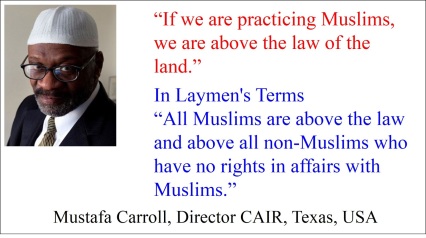Reportage On New Zealand’s Terror Attack Vis-à-vis The Double Standard Applied To Islamic-Based Terrorism: What’s Going On? Commentary By Adina Kutnicki
STIPULATED: the killing of innocents is an egregious crime, regardless of the victims and the perpetrators. Period. Full stop.
BUT we dare not tolerate the abhorrent violation of civilized behavioral norms to deter us from much needed truth-telling because that would be a deadly mistake. A (moral) crime and failing.
MORE revealingly, just because the victims were followers of Muhammad, is the Islamic community now deemed innocent of worldwide Jihad, thereby, exculpated?
ACUTELY, this expert on Islamic Jihad has proven (six ways to Sunday) that an increasingly large portion of followers of Islam slaughter infidels in the belief that God talked to Muhammad, their prophet and supreme role-model, and dictated the Koran to him. As such, Muhammadans are indoctrinated into believing the Koran is the revelation of God’s word, hence, they are mandated to act on the numerous incitements against non-believers. It is this uncomfortable, anxiety-ridden and terrifying truth that western leaders (elected and non-elected elites) dare not address. Their stone-cold silence is both manifold and manifest.
IN this respect, regardless of PC blow-back, pointing out the elephant in the room in no way minimizes the massacre in New Zealand. Simply, true believers of Islam, Muhammadans, are not allowed to embrace the laws of the land outside Dar al-Islam (land of the believers), that is, except for the sake of temporary expediency. Thus, they remain committed to imposing Sharia Law within the west and elsewhere, and by whatever means possible. Killing atop killing. Creep by creep. Despite all else, Westerners must face this ugly truth, if not, it will end up costing a continuous stream of bloody trails.


WITH said disinfectant now clearing the air, let’s get down to the following brass tacks: incontestably, there is highly disparate reporting from so-called mainstream media (and piggybacked by social media) when Muslims, on the VERY rare occasion, are targeted, as juxtaposed against continuous rampages perpetrated by them. Why is this?
MORE specifically, the core issues remain:

- Where is the media’s outrage when Muslims massacre at will throughout the west and beyond, even as they live-stream their carnage on Facebook and the rest of social media? Hint: hide nor hair. In fact, “BANNED: How Facebook Enables Militant Islamic Jihad ” (9/2016) had to be written to document said enabling of their worldwide bloody trails – in tandem with a back-benching media which operates alongside social media giants. Yes, Muhammadans have to be protected at all costs!
- Conversely, this too must be made crystal clear: the media’s fury is consistently selective in nature. Consider: as is known, Christchurch’s killer, Brenton Tarrant, live-streamed via Facebook. This brazen and heinous action (rightfully) sent many poohbahs into collective spasms against social media giants. On the other hand, stone-cold silence ensued after the very same live-streaming during Omar Mir Seddique Mateen’s Jihad at Orlando’s Pulse Nightclub, June 2016. What’s going on?
- It is alongside said double standard and mendaciously biased reporting that the onus is placed on Trump’s head for a massacre which happened across the world! For heavens sake. On the flip side, the very same media-inciters never, ever blamed Obama, most tellingly, when the aforementioned Jihad in Orlando exploded. Mind you, under his two-term tenure, that atrocity came atop countless domestic Jihadi terror attacks. Indeed, why is it no longer expected that reporting remains fair, unbiased, and non-politicized?
- Even more so, how Pavlovian can their (mis)reporting be when, paradoxically, it dovetails with an admission from New Zealand’s mass shooter? Rhetorical. In other words, contained within Brenton Tarrant’s long-winded 74-page manifesto was a desire to stoke a confrontation between “gun control” advocates and those opposed. Well, even a killer can, at times, see the forest from the trees. Not only that, reportedly, he chose firearms (instead of other explosive methods) as a mode of delivery to ignite the fire which would expedite and reveal the grave divisions within American politics. The man is evil but not stupid. Think about this: in a roundabout way he mirrored Obama Inc. – when the Race-Baiter-in-Chief (with a myriad of associates) sparked the gravest division between blacks and whites, ever since the race-roiled 1960’s! Indeed.
- So, Tarrant, twisted as he is, understood this corresponding truth: as a New Zealand gun license holder, yes, he was able to purchase a legal firearm. Still yet, legally obtained or otherwise, he would not have been deterred. Duh. And, just as the sun rises and sets, reflexively, the media pounced on this tragedy to reignite “gun control”, exactly like Tarrant predicted – instead of standing up for VERY long overdue truth-telling. No doubt, he pinpointed the western affliction.
- Now, the aforementioned should hardly be unexpected, disquieting as it is. After all, how could it come as a shock? For, in reality, these ugly truths were outed in BANNED (Sept. 2016) and well documented in bullet-proof fashion. Intrinsically, the very same media complicity is zeroed in on throughout the book. But, most vividly, it hits home in the book’s “AFTERWORD: JIHAD IN ORLANDO: FACEBOOK TAKES CENTER STAGE “, page 151.
OMINOUSLY, it is into this western nightmare – a vortex of hell, to be more precise – that particular dangers must be highlighted, again, regardless of the anger and blow-back it provokes.
BRAZENLY, as if on perfect cue from a maestro, CAIR – the Brotherhood Mafia’s propaganda arm in North America and Hamas’s U.S. front-arm – jumped right in the fray, that is, to orchestrate “prescriptive” measures to protect Muslims – never mind that it is the worldwide Christian and Jewish communities which require 24/7 guard from Islamic Jihad! No doubt, rational folks realize that this is the truth.
PREDICTABLY, their remedy is to silence any and all criticism of Islam – dictated by the Koran ala Sharia Law, as weaponized through the ‘made up out of whole cloth’ bugaboo, Islamophobia!

INFIDELS, wherever you are, trust, CAIR’s emphasis on ‘peaceful’ engagement is nothing short of mendacious lies; that which are underpinned, once again, by Sharia Law via taqiyya and tawriya. Inextricably. Dawa alike.


Reportage On New Zealand’s Terror Attack Vis-à-vis The Double Standard Applied To Islamic-Based Terrorism: What’s Going On?
- This message contains content that has been blocked by our security systems.
- If you think you’re seeing this by mistake, please let us know. Yes, additional “proof-in-the pudding” as to why “BANNED: How Facebook Enables Militant Islamic Jihad” had to be written!}








































No comments:
Post a Comment